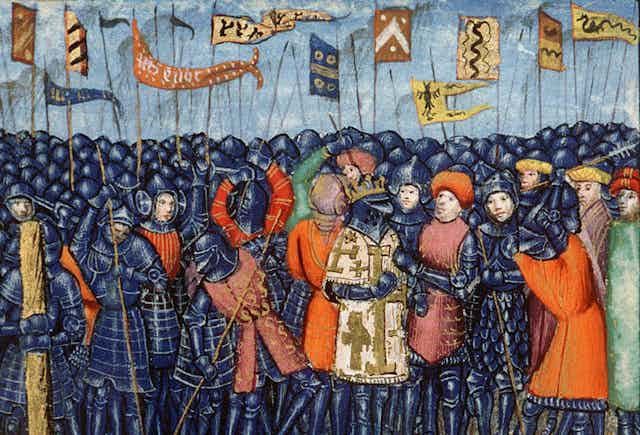Greta Thunberg is on a crusade to save the planet. Elizabeth Warren is on a crusade against Bernie Sanders. Parks in Yorkshire are on a crusade to save the endangered Turtle Dove. Search the word and you will get results from all areas of interest – from sports to politics and everything in between.
What this demonstrates is that the word crusade has many meanings, depending on how it is wielded. While it seems to pop up frequently for all manner of campaigns, strictly religious meanings still prevail.
The word “crusade” has become common in the vocabulary of extremists. Wars in the Middle East are labelled as such by Muslim fundamentalists in order to condemn them. While Christian far-right radicals often use it to describe the driving force behind their killings.
This kind of use is a reflection of modern views of the medieval “crusades” led by Western Christians to conquer Jerusalem from the 11th to the 13th century. Such perceptions have charged a single word with so many, and often contrary, ideological meanings. However, using the term this way is not a new phenomenon.
Historical research demonstrates that since its appearance in the middle ages the word crusade has always had very different meanings and has repeatedly served as a political instrument. Untangling this history of the word can help better understand and counter the extremists who use it.
The term “crusade” appeared in the 1210s, more than a century after the launching of the first expedition to Jerusalem in 1095. Despite our understanding of what “the crusades” are, it wasn’t used to describe these expeditions. Instead, it was used in reference to other wars promoted by the pope, against Muslims in Spain and Cathar “heretics” in southern France.
This use of the word created a common category, the “crusade” – a military campaign waged to defend faith. This meaning now associated these conflicts with the expeditions in the Middle East and opened the way to complete assimilation of wars fought against different enemies, in varied places and often for similar reasons.
Considering the moral sanctity associated with defending the “Holy Land” in Christian minds, the word quickly took on a legitimising function. Any contested action could be justified by dubbing it a “crusade”. It, therefore, became a word used to wield power and silence denouncers. In the middle ages, the term described new taxes imposed by the kings of Castile, wars led by the popes against their political opponents or Europe-wide collections of faithful donations (called indulgences).
The indulgences were the main motif of Protestant criticism against papal leadership in the 16th century. The word “crusade” then became associated with papal excesses and, in northern Europe, a synonym for any form of violent campaign prompted by religious motives.
Similarly taking a negative view of the word, the Enlightenment philosophers considered the expeditions to Jerusalem as a demonstration of Catholicism’s violent and intolerant attitude. Scottish philosopher David Hume, in the first volume of his History of England, wrote of them this: “The Crusades - the most signal and most durable monument of human folly that has yet appeared in any age or nation.” The negative connotation of the word was therefore strongly reinforced.

From the end of the 18th century, “crusade” was widely employed to criticise any movement considered as backward looking or needlessly aggressive. Conservative political attitudes, in particular, were frequently disqualified as “crusades”.
Interpretation of the crusades changed again towards the end of the 19th century: viewed as heroic enterprises led by pure and generous knights. The idea and use of the word evolved accordingly, designating any noble cause.
Both world wars were dominated by ideologies of simplistic opposition of good against evil. This new meaning of the word crusade fitted well this conception. As a result, crusades against diseases, war or unemployment, crusades for temperance, children or good manners flourished in western societies in the 1940s and 1950s, particularly in Catholic and Anglo-Saxons countries. But in Germanic and Eastern European countries the negative understanding of “crusade” remained stronger, and the word was not as commonly used.

Crusade today
The final change occurred in the 1960s. Criticism against colonialism and western interventions considered the medieval expeditions in the Middle East as acts of racism and violent conquest. Positive meanings became more frequently condemned or avoided. We are still strongly influenced by these conceptions, but the previous meanings haven’t disappeared.
“Crusade” can nowadays be understood and employed with an almost infinite variety of senses according to a person’s origin, culture, education or religious position. That’s the reason George Bush’s “crusade on terrorism” provoked much more criticism than Harry Truman’s “crusade against communism” in the 1950s.
When using the word, meanwhile, extremists rely on a single meaning based on their understanding of the medieval “crusades”. Christian supremacists remain faithful to the early 20th-century visions and consider the crusade as a holy cause. Muslim fundamentalists are influenced by later conceptions and condemn them as an act of imperialism. In both cases, the crusades are read as a basic opposition between Christians and Muslims.
The term can, therefore, be used to promote a simplistic idea of the eternal fight between good and evil. By doing so, extremists are not misusing the word “crusade”. They’re using it as it has always been used: to support an ideology.

